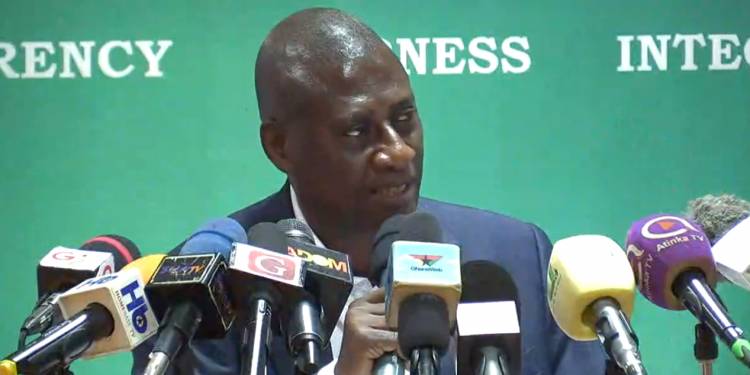The Electoral Commission (EC) has announced that the parliamentary election results for four constituencies—Dome Kwabenya, Okaikwei Central, Ablekuma North, and Tema Central—will be deemed illegal due to serious violations of the electoral process. This decision came from Samuel Tettey, the Deputy Chair of the EC for Operations, during a press conference in Accra on Friday.


Tettey clarified that out of the 12 constituencies requiring a re-collation of results, three—Suhum, Akwatia, and Fanteakwa North—had been successfully completed. However, re-collation in the remaining constituencies including Ahafo Ano South West, Ahafo Ano North, Obuasi East, and Techiman South has not yet occurred.
The deputy EC chair explained that the situation in the four contested constituencies was particularly concerning due to the disturbances that marred the collation process. He emphasized that the process was disrupted in a way that breached the Electoral Commission’s laid-down procedures, as stated in CI 127. Despite the presence of police officers at the collation centers to maintain order, party supporters overran the process, forcing the EC staff to abandon their duties and announce results according to the preferences of the parties involved.
The EC has concluded that the electoral process in these constituencies was fundamentally flawed and cannot be upheld. "The process was compromised, and it is the conclusion of the commission that the collation and declarations which did not follow the laid-down procedures are illegal and cannot be upheld," Tettey stated.
The events surrounding these constituencies are part of a wider trend of disruptions that took place during the collation of results in the 2024 parliamentary elections. Several constituencies across the country faced similar issues with violent incidents and intimidation of EC officials. These events have raised major concerns about the integrity of the election process in some areas and the safety of those involved in conducting the election.
In Dome Kwabenya, Elikplim Akurugu, who contested for the National Democratic Congress (NDC), won the seat, flipping it from the New Patriotic Party (NPP). However, Mike Oquaye Jr., the NPP parliamentary candidate, rejected the results, citing disruptions by a mob that interfered with the electoral process. Oquaye demanded a re-collation of the votes, arguing that the disturbances had tainted the legitimacy of the election results.
Similarly, in Okaikwei Central, the collation process was moved to the regional center after violence broke out at the constituency center. The violence led to the destruction of ballot papers, further complicating the counting and verification process. Baba Sadiq, the NDC candidate, was eventually declared the winner, securing 15,383 votes, narrowly defeating the incumbent, Patrick Boamah, who garnered 14,949 votes. Boamah has since indicated his intent to challenge the results in court, citing the irregularities during the election process.
The situation in Tema Central and Ablekuma North was equally contentious. In Tema Central, Ebi Bright of the NDC was declared the winner, while Ewurabena Aubynn, also from the NDC, emerged victorious in Ablekuma North. In both cases, party supporters reportedly attacked collation centers, further complicating the process. These disturbances have led to widespread allegations of vote tampering and manipulation, casting doubts over the credibility of the results.
The incidents in these constituencies have sparked a broader debate about the security and transparency of the election process in Ghana. Many Ghanaians are concerned about the ability of the EC to conduct free and fair elections under such circumstances. The election-related violence in these constituencies has highlighted the need for stronger measures to prevent electoral malpractice and ensure the safety of election workers.
Despite these challenges, the EC’s stance remains firm. It has emphasized that the electoral process must adhere strictly to the regulations set out in CI 127. Any deviation from this process, especially when it involves the influence of party supporters or other external factors, will not be accepted. The EC's decision to declare the results in these constituencies illegal serves as a warning to all stakeholders involved in the election process.
The aftermath of this announcement is expected to fuel further legal battles, as candidates and political parties challenge the results in court. While the EC has declared the results in these constituencies void, it remains to be seen what impact this will have on the broader political landscape in Ghana.
As the country moves forward in the aftermath of these elections, the calls for electoral reforms and a more robust approach to preventing election-related violence and ensuring transparency will likely intensify. The integrity of the electoral process remains a central issue for Ghanaians as they seek to ensure that future elections are conducted fairly and without disruption.
The events in Dome Kwabenya, Okaikwei Central, Ablekuma North, and Tema Central highlight the ongoing challenges facing Ghana’s electoral system. With the EC taking a firm stance on the invalidation of results in these constituencies, the focus will now shift to the re-collation process and the legal challenges that are likely to follow.




No comments yet
Be the first to share your thoughts!